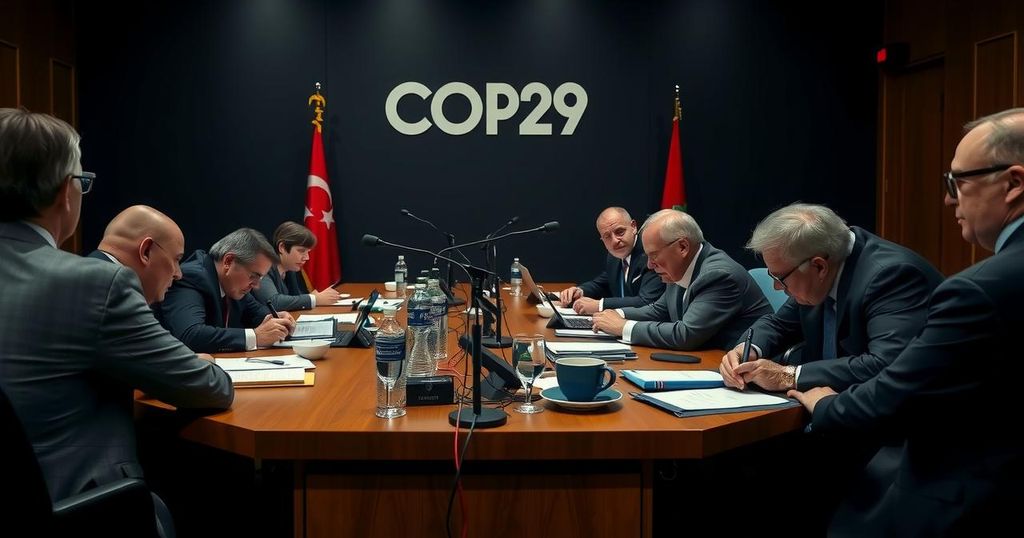COP29 Negotiators Seek Solutions After G20’s Climate Financing Declaration

At the COP29 climate talks in Baku, negotiators are striving to overcome a deadlock following a G20 summit that acknowledged the need for substantial climate financing for developing nations. Key issues regarding the amounts and sources of funding remain unresolved, prompting a call for increased commitments from wealthy countries. The G20 declaration, while a step forward, has resulted in mixed reactions due to its lack of specificity on essential climate issues, particularly in transitioning from fossil fuels.
Negotiators at the COP29 climate conference in Baku are working tirelessly to resolve a deadlock following the recent G20 summit that recognized the pressing need for substantial climate financing for developing countries. Despite this acknowledgment, key issues pertaining to funding amounts, contributors, and the nature of financing options remain unresolved. The G20’s declaration has been met with mixed reactions, as it lacked significant details on the necessary transition from fossil fuels and did not sufficiently outline climate financial commitments. Yalchin Rafiyev, Azerbaijan’s lead negotiator, noted that the G20 text provided encouraging guidance for ongoing discussions. UN climate chief Simon Stiell emphasized the necessity for nations to move beyond rhetoric towards actionable consensus, particularly in light of Brazil’s upcoming hosting of next year’s climate talks. Countries, particularly from the developing world, continue to advocate for a more substantial commitment from wealthier nations, which is currently articulated as an increase in annual funding from the promised $100 billion toward a needed $1.3 trillion to tackle climate challenges effectively. The G20 declaration did highlight the urgency of scaling up climate finance, stating that billions must transition to trillions from various sources. However, many delegators, such as Adonia Ayebare from the G77+China coalition, voiced concerns regarding the explicit call for public funding to be prioritized over loans. The dynamics of negotiation have also been complicated by Saudi Arabia’s reluctance to acknowledge previous commitments to reduce reliance on fossil fuels. Fiji’s Deputy Prime Minister, Biman Prasad, pointedly remarked on the disparity between current fossil fuel subsidies and proposed climate financing, asserting that sufficient funding exists but is misallocated. Stressing the need for unity, EU climate envoy Wopke Hoekstra urged the global community to avoid regressions in climate commitments made at past summits. As the conference continues, a new draft deal on climate finance is expected to be presented, carrying on the essential discussions from the G20 and prior climate agreements.
The COP29 climate talks represent a crucial platform for international negotiations addressing climate change and its impacts, particularly on developing nations. Various global summits, including the G20, serve to shape the narratives and decisions made at these climate forums. Notably, discussions frequently revolve around financing mechanisms needed for poorer countries to effectively respond to climate change and transition to sustainable energy sources. The complexities of negotiation are amplified by differing economic circumstances among nations, with a significant divide between the necessities of developing countries and the commitments of wealthier nations. The G20’s involvement is particularly noteworthy as it brings together major economies and their respective stances on climate action, making their declarations impactful on subsequent negotiations. A continuous challenge remains in bridging financial gaps and establishing responsibilities among nations to mitigate climate change effects equitably.
In sum, the COP29 discussions are pivotal as negotiators strive to address substantial issues surrounding climate financing for developing nations. The mixed reactions to the G20 summit’s declarations highlight existing concerns regarding the clarity and scope of financial commitments needed. With ongoing negotiations, there is an expectation for a new draft deal on climate finance that aligns with the urgent need for a collaborative approach to climate action. The concerted efforts being made at COP29 will be essential in reinforcing global climate commitments moving forward.
Original Source: www.rfi.fr





